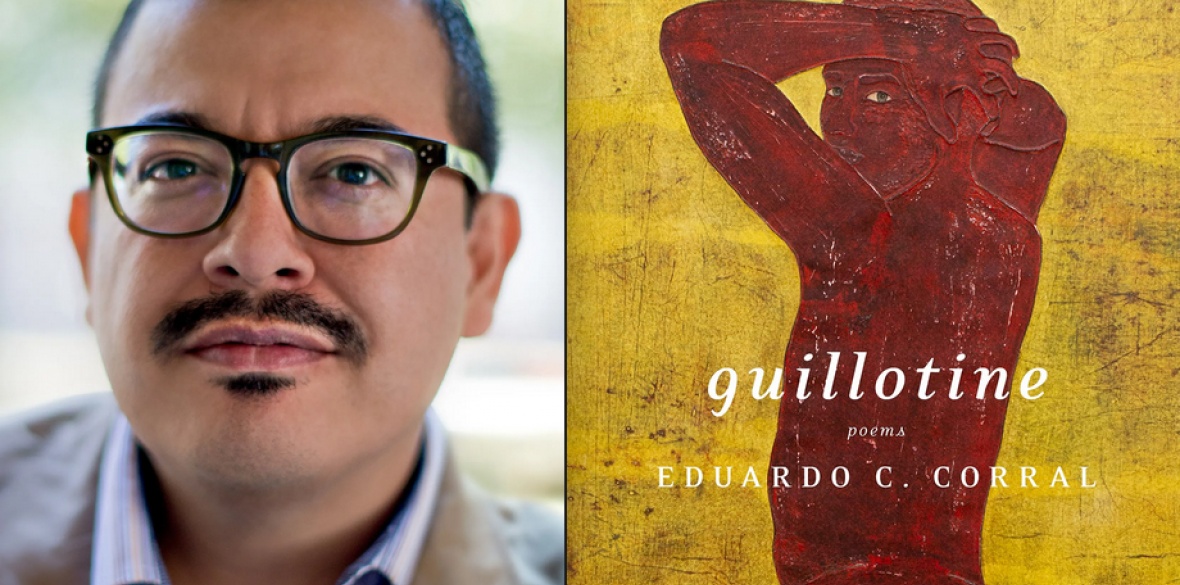This is the last article you can read this month
You can read more article this month
You can read more articles this month
Sorry your limit is up for this month
Reset on:
Please help support the Morning Star by subscribing here
CARLOS ANDRES GOMEZ’S new poetry collection Fracture (University of Winsconsin Press, £13), winner of the Felix Pollak prize in poetry is one of the most striking poetry books by a Latinx author being published this year.
It interrogates with devastating precision and clarity Latino men’s beliefs and histories, as well as the cultural heritage and dominant messaging about masculinity.
Gomez also explores the complex issues of race and gender, aspects of fatherhood, filial love and bilingualism within the Latinx community of New York.
It is a highly personal book that uncovers, with lyrical beauty and compelling language, the difficult aspects of growing up a Latino in the US.
In Pronounced he writes: “You excavate anything that has tried to lodge itself/in your body without permission. You bury the toothbrush/between your back molars and scrape whatever/ you find. One loss makes you feel all other losses./Eleven years later, when you no longer eat pizza/or speak Spanish, when your father’s profile invades/your clenched jawline, you borrow his brisk gait,/his snort, his face. People say you look white./Your father never does.”
This is a brave book that lingers on, a must read from one of my favourite Latinx poets writing today.
Guillotine (Graywolf Press, £13) is Eduardo C Corral second poetry collection and one that cements him as one of the most exciting Latinx writers of his generation. The son of Mexican immigrants, a lecturer at North Carolina State University Corral explores his Latin America heritage, the Mexican diaspora to the US, as well as aspects of bilingualism, sexual identity and queer desires.
Testaments Scratched into a Water Station Barrel is based on the photograph Humane Borders Water Station by Delilah Montoya: “After writing my ekphrastic poem, the water station barrels stayed with me — I kept imaging stories, rants, wishes and confessions that might be scratched into the blue of the barrels. Speakers began to arrive: Mexican & Central American immigrants making visible the worlds inside them,” Corral explains.
These poems, where Corral switches from Spanish to English and vice-versa, are filled with anger and grief, but also with hope. He delves into the world of migrants crossing the US/Mexican border, their moving survival stories of what they leave behind and what lies ahead.
These verses speak with the desperate voices of displaced peoples. “In the desert, the moon/shivers. Tonight, to stay awake, I’ll cut my feet/with glass./Outside Oaxaca, in a clinic, my mother said,/‘I hate our Indian face.’/In the dream I’m running.”
But there is also irony and dark humour aimed at a racist US audience: “if you see/a Mexican/walking down/the road &/hit him/just right/you can grease/your truck.”
In Cordoba Corral also brings in personal experiences about queer desire and Latin American machismo —- reflecting upon homophobic attitudes within his own family — “In a bathroom/with turquoise walls,/my reflection bleeds. I reach/to clean, with my thumb,/an oval mirror speckled/with toothpaste/... /then I remember —/pull back my left hand./I don’t touch mirrors. It’s wrong,/my father always said,/to touch a man.”
There are echoes of Cesar Vallejo and one of my favourites is dedicated to Francisco X Alarcon: “Copal, popote, tocayo, cacahuete:/you taught me Spanish/is a colonial tongue./Some Mesoamerican elders/believed there’s a fifth direction./Not the sky or the ground/but the person right next to you./I’m turning to you, maestro./I’m greeting you./Tahui.
Queer Latinx writer Benjamin Garcia, whose debut collection Thrown In The Throat (Milkweed Editions, £13) was the winner of the National Poetry series in the US works as a sexual health and harm reduction educator in New York state.
This powerful book that is as innovative and experimental as fiercely camp. It challenges pre-conceived notions of queer Latinx identity, and the trappings of language in relation to the wider LGBTQ+ experience.
In Ode to the Touch-Me-Not, Garcia writes about the limits of language, the desires of gay bodies and about sexual consent, “In the language of consent//I revoke//in the affirmative/but I’ll tender for you and enthusiastic//get bent//my body/isn’t up for debate//so you can go//shave your palms now/drop dead//bitch I might//take a page from female dragonflies/that fall on their backs.”
Like Corral, Garcia also talks to his father. In Conversations with My Father//A Poem in Closet Verse, moves between his father’s demands and his own way at dealing with them. “When was the last time/you took a girl to the movies?//It’s been a long time/since I’ve seen a movie […] I mean I would like it if you made me/a grandfather again.//You either are or you aren’t./There is no again.”
It’s a brave and original debut collection with strong use of language, form and syntax. A stunning debut collection.













